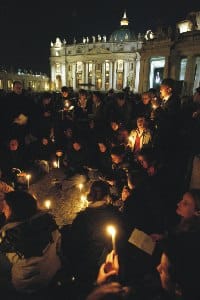Pope a conservative who revolutionised the papacy
AFP, Vatican City
Pope John Paul II, who was slipping towards death Saturday, has revolutionised the papacy, contributing to the collapse of communism in Eastern Europe but alienating many Roman Catholics with his conservative social views. The 84-year-old head of the Roman Catholic Church, who has struggled to overcome the effects of his advanced age and Parkinson's disease, suffered a devastating heart attack on Thursday, Vatican spokesman Joaquin Navarro-Valls said. The Vatican, which called on the world's Catholics to step up their prayers, was expected to release a new statement about his condition later Friday. The new setback came as the pope struggled to recover from a February 24 throat operation, which has forced him to miss key Easter celebrations last week. The first non-Italian pope in four-and-a-half centuries, and the first from Eastern Europe, John Paul II, born Karol Wojtyla, is the 263rd successor to Saint Peter as Bishop of Rome. A warm and earthy figure, he has been immensely popular, imposing his own style and agenda on the papacy, eschewing the pomp that surrounded his forebears and seeking contact with ordinary people. He has given the papacy a higher profile than it had ever had before. He travelled to 129 countries, taking his message directly to his flock of more than one billion believers and displaying public relations skills unknown to his predecessors. Born in a small town near Krakow, southern Poland on May 18, 1920, Wojtyla was brought up by his father, an army officer, after the death of his mother when he was eight. His elder brother, a doctor, died in 1932 during an outbreak of scarlet fever.
|

Tens of thousands of pilgrims gather for prayers under Pope John Paul II's lighted apartment windows late Friday at the Vatican City as his condition worsened and senior prelates signalled he was close to death. PHOTO: AFP |